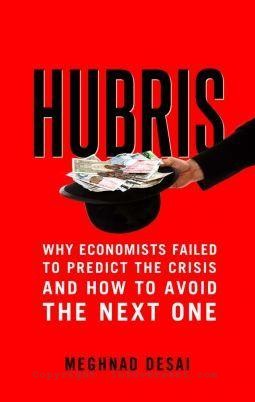Hubris by Meghnad Desai is a thriller for an Economics graduate, an eye opener for a new Economics student, and for someone like me who has not studied economic, ever, it is an exciting journey in the history and different theories of Economics – from Walras-Marshall to Keynes.
No matter what you do, Economics touches us all. At the micro level of managing our home finances and making investment decisions, to a macro level of national budget and international treaties. Hubris takes the reader to where it all began.
Hubris: Why Economists Failed to Predict the Crisis and How to Avoid the Next One
Author: Meghnad Desai Pages: 304 Publisher: Yale University Press (April 15, 2015) Language: English ASIN: B00VEHAGXO ISBN: 9780300213546
What is it that creates these crises? Is it the stock of gold, or is it the rising population. Or is it the technology revolutions that we all hail so much that render millions jobless with each leap. The author tries to answer all these questions by looking at how economic theories, policies, and changing perspectives of economists at different times in our history have helped create the hills and troughs in the financial world.
The discussion of economic theories of Marshall and Keynes paves way to the new classical economic theories that emerged in the global economy in the 70s, in the later part of the book. The author discusses the post World War II boom in America and the following crisis in Declining Fortunes that highlights the effects of rising oil prices on global economy. The time of stagflation threw up new models and theories that harped back on the Marx’s theories and looked at the share of capital and wages in an economy. The author explains that as the share of wages rose, the profit margins went down and triggered migration of manufacturing jobs to destinations that offered cheap labor.
But the adherents of New Classical Economics starting with Robert Lucas disconnected labor market from inflation and rejected the Keynesian principles. This was also the time when economists accepted people’s expectation of price movement as rational and assumed that markets were efficient. Any thought of overheated stock prices or stock bubbles was rejected outright.
The author begins Part II with The new Globalization, which looks at the roots of the Great Recession. He warns the reader that data can be helpful, but interpreters can read causation where there is only correlation. The author explains the signs and factors that economists missed during the moderation of 90s and incorrect attribution of reasons of low inflation in developed economies.
New technology, trade policies, and other such factors were continually changing financial world. The exuberance of the markets and misplaced confidence drained the conservative voices of economists such as Raghuram Rajan – chief Economist of IMF at that time. The refusal to think of the alternative put a heavy price on global economy.
“In looking away from where the majority look, we may make discoveries that are sometime illuminating .”
~ Lord Meghnad Desai
Hubris is an account of many influential economists and their theories that have helped us understand the financial world. Cycles, I guess, are bound to happen. Human nature dictates that people invest when they see potential gain and conserve when they sense danger. The challenge, of course, is to understand the cyclic changes and the factors that effect these changes. Globalization has made this task of predicting changes much more complex than it was a century ago.
Hubris takes you deep into the world of economists and the various approaches that have shaped thinking of people positioned to make decisions about your economic life. Hubris is a definitive guide on the progress of economic thought of the last couple of centuries for both: readers who are connected to finance and economics, and readers who are fascinated by the economic and financial upheavals in our world.
